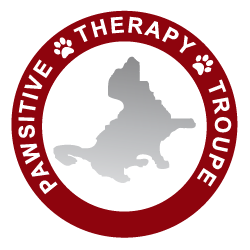Pet Partners Animal-Assisted Crisis Response Program (AACR)
PAWSitive Therapy Troupe Pet Partner AACR-trained teams are now available to provide comfort to those who have been affected by natural, human-caused or technological disasters. Our therapy animal teams may be requested by schools, government agencies or first responders. We never self-deploy but we are ready to provide comfort and stress relief where we have been invited.
What is Animal-Assisted Crisis Response (AACR) and why is it effective?
AACR is a class of animal assisted activities that provides comfort to those who have been affected by disasters such as extreme weather or acts of violence in the community.
a class of animal assisted activities that provides comfort to those who have been affected by disasters such as extreme weather or acts of violence in the community.
The safety, familiarity, novelty and interest in the animal has been found to be impactful when building rapport with a person affected by crisis. The volunteer handler can then offer comfort, reduce anxiety, and provide the opportunity for contact and engagement, and when needed, connect a client to emergency personal and professionals for additional assistance.
AACR is not a professional mental health intervention. The PAWSitive Therapy Troupe AACR Pet Partner handlers must complete training that includes psychological first aid concepts (sometimes also referred to as mental health first aid). Psychological first aid is a form of stabilization. Stabilizing individuals results in an environment where recovery can occur. AACR does not take the place of professional interventions, but our AACR teams provide emotional support through listening, empathy, and sharing the unconditional love of our animals. We are a resource for health and human service providers on site. We are there to support people during an emotional time—to provide empathetic listening while sharing our animals. We are NOT first responders, counselors, doctors or therapists.
Our Pet Partner AACR teams do NOT self-deploy following a crisis. We must be invited by first-response, community support or educational personnel with the authority to issue that invitation.
Where AACR Teams Might Be Asked to Visit:
 AACR visits can occur at schools, community centers or other places where our therapy dogs currently visit. Since we have already established professional, trusting relationships with these facilities, it would be natural for them to invite our therapy teams to help a community deal with crisis situations. However, AACR teams may also be requested at locations where our therapy teams do not typically visit, such as:
AACR visits can occur at schools, community centers or other places where our therapy dogs currently visit. Since we have already established professional, trusting relationships with these facilities, it would be natural for them to invite our therapy teams to help a community deal with crisis situations. However, AACR teams may also be requested at locations where our therapy teams do not typically visit, such as:
- General Population Shelters - these shelters are a form of temporary housing where people in the affected area might be relocated to. Often located in schools, recreation centers or other large facilities, theses shelters have spaces for sleeping and eating.
- Family Reception Centers - in the immediate aftermath of a disaster involving mass casualties or fatalities, these are temporary holding sites where individuals attempt to locate family and loved ones from whom they have been separated. These might be very near the disaster scene or in a healthcare facility where the injured have been transported.
- Family Assistance Centers - Opened in the event of a disaster involving mass casualties or fatalities, these are centers that offer a range of service including mental health, spiritual care, crime victim services, law enforcement, disaster relief agencies, and access to other state and federal agencies.
- Phone Banks - Communities may set up a phone bank to address and respond to callers with questions that arise after a disaster. The individuals answering phones are often under stress and fatigue and may benefit from a visit from a therapy animal.
- Respite Centers - for first responders-these locations are places where first responders can rest and eat. They are usually opened where prolonged rescues and recovery efforts are necessary and are close in proximity to the disaster area. Again, AACR animals are not just for survivors—they can benefit responders as well.
What Kinds of Additional Training Do Pet Partner AACR Teams have?
Training in Basic Response Skills
 Basic disaster concepts and best practices in crisis support
Basic disaster concepts and best practices in crisis support
- Psychological first aid
- Training and practicing skills in building rapport, active listening and de-escalation techniques while maintaining appropriate boundaries
- Training in techniques to manage volunteer stress to avoid compassion fatigue and vicarious trauma
- Completion of the Federal Emergency Management (FEMA) Incident Command System, or ICS. ICS is a standardized emergency management tool that integrates facilities, equipment, personnel, procedures and communications through a common organizational structure.
Additional Information
- Pet Partner AACR teams are covered by the Pet Partners liability insurance.
- Pet Partner AACR teams will be clearly identified by Pet Partner logo-branded clothing and ID badges.
If you would like to discuss inviting our PAWSitive Therapy Troupe AACR teams to provide comfort following a crisis at your location, please contact us at:
Shay Jacobson, Troupe AACR Coordinator
630-779-2855 or
OR:
Source: “Orientation to Animal-Assisted Crisis Response” Pet Partners Therapy Animal Program, 2019 -- https://petpartners.org

